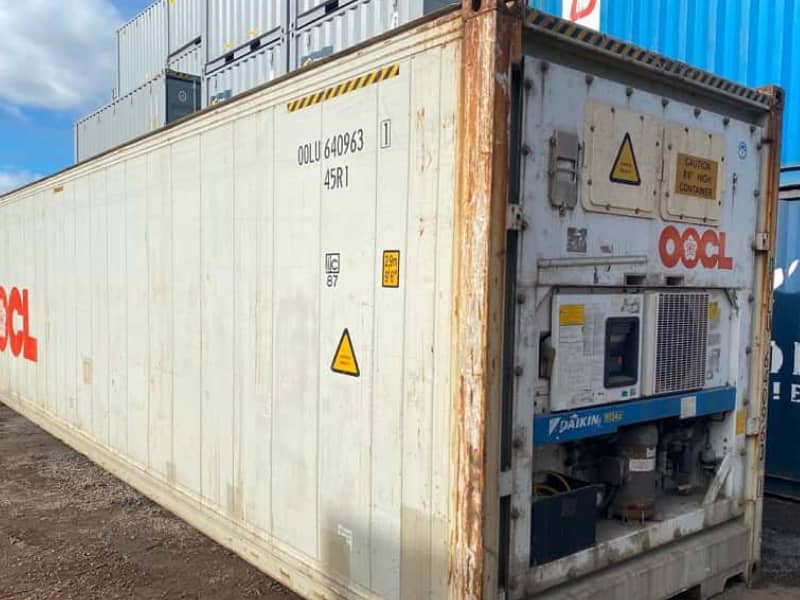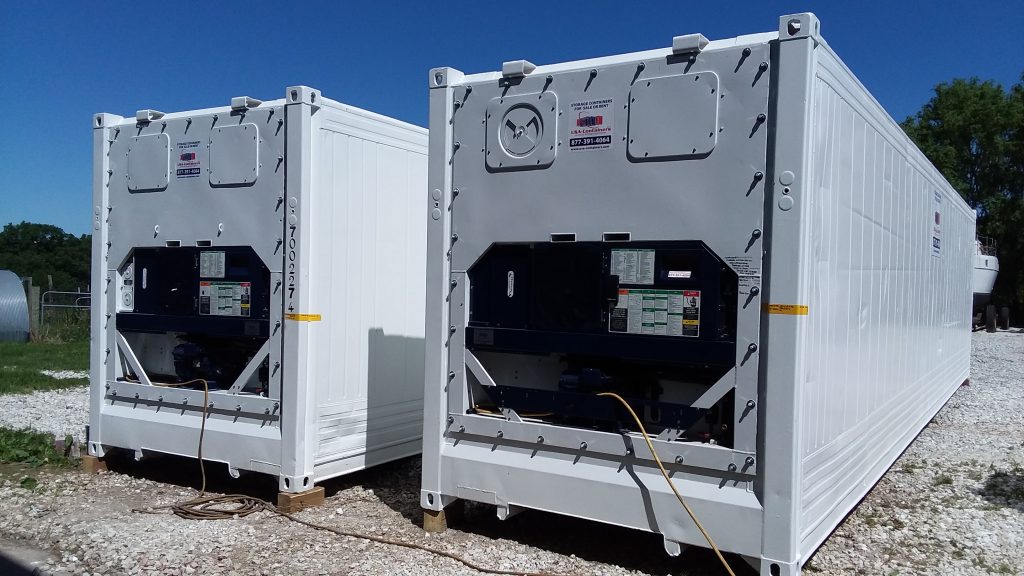Used 40 Ft High Cube Refrigerated Containers are ideal for commercial storage
All Concerning Freezer Containers: Vital Insights for Your Storage Needs
Cold store containers play an essential duty in the preservation of perishable goods. They can be found in different types, consisting of refrigerated and protected units, each made for details storage requirements. Recognizing the advantages and vital attributes of these containers is necessary for companies intending to enhance their procedures. As the demand for efficient storage space services grows, discovering the different alternatives available can bring about notified decisions that affect both profitability and sustainability. What aspects should one think about when selecting the ideal container?
Kinds of Cold Store Containers
Freezer containers can be found in numerous types, each made to meet particular temperature control requirements. Among one of the most common types are cooled containers, which keep temperatures between 0 ° C to 10 ° C, making them appropriate for subject to spoiling items like fruits, veggies, and dairy items. Another type is the deep freezer container, which operates at temperatures below -18 ° C, perfect for lasting storage space of icy things such as meats and fish and shellfish.
Insulated containers provide temperature stability without active air conditioning, making them helpful for temporary transport of temperature-sensitive products. Additionally, there are portable freezer units, which offer flexibility in locations and are typically used in events or seasonal operations. Lastly, blast chillers rapidly reduce the temperature level of hot foods, guaranteeing security and high quality. Each kind serves an unique purpose in numerous markets, from food service to pharmaceuticals, stressing the relevance of selecting the best container for particular storage needs.

Benefits of Making Use Of Cold Storage Space Solutions

Cool storage space options expand the shelf life of products, minimizing waste and enhancing productivity for services. By efficiently managing stock with proper temperature level control, business can optimize their supply chains and improve functional performance.
In addition, freezer facilities enable versatile storage options, fitting numerous volume demands and seasonal changes popular (used 40ft refrigerated shipping containers). This adaptability aids organizations respond swiftly to market modifications
Lastly, employing freezer options can guarantee compliance with health and wellness laws, guarding both customers and companies. Overall, the strategic use cold store boosts item management while advertising sustainability and economic practicality.
Trick Features to Seek in Cold Storage Space Containers
When picking chilly storage containers, numerous key functions benefit mindful consideration to safeguard peak efficiency and dependability. Temperature control capabilities are crucial; containers need to keep consistent temperatures suitable for certain products. Insulation high quality also plays a significant role, as exceptional insulation decreases energy consumption and boosts temperature stability.
Next, convenience of accessibility and loading is important; containers must use easy to use designs for reliable handling and company. Toughness is one more essential aspect; weather-resistant products ensure long life and guard materials against ecological aspects.
Additionally, mobility functions, such as integrated wheels or raising points, facilitate transportation, while customizable formats permit customized storage space services.
Lastly, checking systems, including temperature level alarms and remote tracking, give real-time updates, making sure that conditions continue to be excellent. By concentrating on these functions, users can pick cold storage space containers that meet their operational needs properly.
Choosing the Right Freezer Container for Your Needs
Selecting the appropriate freezer container calls for a thoughtful evaluation of details requirements and functional requirements. Factors such as the type of items being stored, temperature level of sensitivity, and volume ought to be focused on. Disposable food things may necessitate containers with strict temperature level controls, while pharmaceuticals may require precise problems to maintain efficacy.
Furthermore, prospective customers should take into consideration the container's dimension and mobility. A larger unit may be needed for mass storage space, while smaller sized, mobile choices can be perfect for momentary or on-site requirements. Insulation high quality and power performance are additionally essential, as these will certainly influence functional prices and temperature level security.
Compliance with industry laws and criteria is necessary, especially in industries like food and health care. go to these guys By very carefully assessing these aspects, users can select a cold store container that successfully satisfies their unique requirements and guarantees optimum storage problems.
Ideal Practices for Preserving Cold Storage Space Issues
Maintaining optimal cold store conditions is vital for preserving the quality and safety and security of temperature-sensitive items. Consistently checking temperature and moisture levels is essential; utilizing trustworthy digital thermometers and hygrometers can give accurate analyses. Proper insulation of chilly storage containers assists minimize temperature variations and energy loss.
Carrying out a first-in, first-out (FIFO) system ensures that older supply is used before more recent stock, lowering waste (used 40ft refrigerated shipping containers). Furthermore, keeping an organized design within the storage room permits far better airflow and reduces the threat of cross-contamination
Routine maintenance examine tools, such as compressors and seals, are necessary to stop malfunctions. Team training on best methods for packing and dumping items aids maintain temperature stability. Keeping doors closed as much as possible limitations warm exchange, ensuring that the cool storage space setting continues to be secure and reliable in maintaining beneficial items.
Price Considerations for Cold Storage Solutions
When examining cold store services, it is necessary to take right into account the first financial investment prices along with recurring functional costs. A thorough breakdown of these costs can reveal substantial lasting cost savings capacity for companies. Comprehending these monetary aspects aids stakeholders make notified decisions regarding their freezer requirements.

First Financial Investment Prices
The financial landscape of cold store containers presents various first financial investment prices that businesses must consider. These costs generally consist of the acquisition or rental rate of the containers, which can differ based upon type, insulation, and size high quality. In addition, expenditures connected to retrofitting existing structures to accommodate cold store has to be factored in, particularly if specialized tools is needed. Setup costs, consisting of electrical job and refrigeration systems, additionally contribute to the total preliminary investment. Organizations should not overlook transport costs for delivering containers to their desired place. Ultimately, potential modification alternatives, such as shelving or temperature level monitoring systems, can even more affect the preliminary economic her comment is here expense. Careful budgeting for these elements is essential for effective freezer execution.
Operational Expenditures Failure
Functional expenses for freezer remedies encompass numerous essential expense factors to consider that companies need to navigate. Key aspects consist of energy expenses, which can be significant due to the requirement to keep low temperature levels. Upkeep expenses are likewise substantial, as regular servicing is vital to ensure devices runs efficiently and stays certified with health and wellness requirements. In addition, labor expenses might emerge from the need for specialized staff to take care of and check the storage space environment. Insurance coverage expenses are another consideration, as business need to shield their investments versus possible losses. Ultimately, any kind of possible governing compliance expenses need to be factored in, as services might require to purchase systems that stick to food safety and environmental regulations. Comprehending these expenses is critical for effective budgeting.
Long-Term Financial Savings Possible
Spending in chilly storage options supplies significant long-lasting savings potential, transforming initial expenses right into monetary efficiency over time. By lessening wasting and waste, services can enhance their profit margins substantially. Advanced insulation and energy-efficient systems minimize energy costs, which gather over the lifespan of the tools. Cool storage containers frequently call for less frequent maintenance compared to typical refrigeration techniques, leading to reduced fixing costs. The capacity to shop products for prolonged durations without jeopardizing quality permits companies to maximize market changes, maximizing earnings. Additionally, the scalability of cold store options enables business to adapt to altering needs without incurring extreme prices. Generally, these elements add to an engaging case for chilly storage space as a cost-efficient investment method.
Frequently Asked Questions
For How Long Can Food Be Stored in Cold Storage Space Containers?
The period food can be stored in cold store containers differs by type. Generally, perishable things last from days to weeks, while frozen foods can stay risk-free for months, relying on proper temperature and storage conditions.
Are Cold Store Containers Energy-saving?
The power performance of cold store containers varies based on design and insulation quality. Modern systems usually make use of advanced technology to minimize energy consumption, ultimately adding to reduced operational costs and environmental impact in long-term use.
Can Cold Store Containers Be Customized for Particular Needs?
Cold store containers can indeed be customized to meet particular needs. Alterations may consist of temperature level controls, dimension modifications, and extra functions, allowing customers to customize options successfully for different storage requirements and functional preferences.
What Are the Common Dimensions of Cold Store Containers?
Cold store containers usually come in basic sizes such as 10, 20, and click to find out more 40 feet. These measurements fit various storage space demands, making sure versatility for businesses requiring temperature-controlled atmospheres for delicate materials or subject to spoiling goods.
Do Cold Store Containers Require Unique Licenses for Usage?
Freezer containers frequently need unique authorizations for usage, depending upon regional regulations and intended applications. Authorities might mandate permits to assure security standards, ecological conformity, and appropriate functional practices are preserved during their usage.
Cold storage space containers come in different kinds, each developed to satisfy specific temperature level control demands. Additionally, cool storage space centers permit for versatile storage space options, accommodating different volume needs and seasonal variations in demand. Selecting the right chilly storage space container needs a thoughtful assessment of functional needs and particular requirements. The financial landscape of cold storage space containers provides numerous first investment expenses that businesses need to consider. Cold storage containers can undoubtedly be tailored to meet particular requirements.